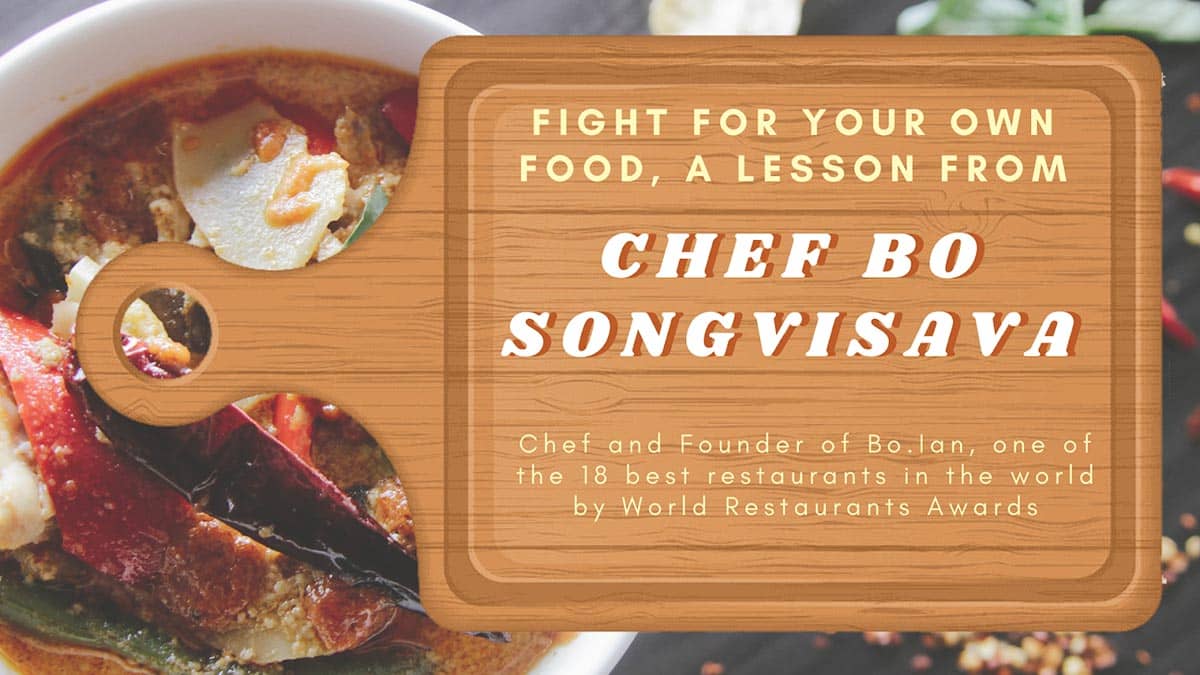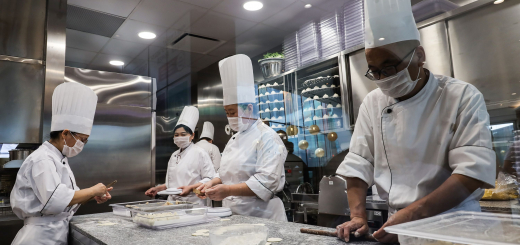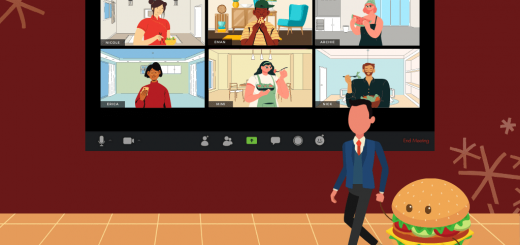Fight For Your Own Food, a Lesson from Chef Bo Songvisava

Last 18th of February, the IHM Department under Ms. Bel Castro held “In Conversation With: Chef Bo Songvisava”. This webinar featured Chef Duangporn “Bo” Songvisava, chef and owner of Bo.lan in Thailand, 2013’s Best Female Chef in Asia by Asia’s 50 Best Restaurants, and was also recently profiled on the fifth season of Netflix’s Chef’s Table. Hosted by Michella Dib alongside her co-hosts Nicole Chua, Archellaine Panganiban, and Jose Garcia, they asked Chef Bo some thought-provoking questions regarding her journey, her philosophies, and aspirations in regards to the food industry.
To start, the hosts began with questions regarding her story of becoming a chef. When asked what drove her to become the chef she is today, Chef Bo shared that her passion for preserving and passing on Thailand’s food heritage as well her own interests in sustainability have been driving factors in molding her into the chef she is today. It was also through following her heart and determination that she was able to uphold her belief that, “To have good food, you must take care of the environment.” She also explained that this philosophy of preserving her country’s cuisine while being environmentally friendly was brought about by her upbringing but also through her travels.
Still in the topic of her journey in the culinary field, she was asked what advice she could give to the aspiring culinary students when it comes to stress and hardship. She responded that “If you really love it, you won’t need to force yourself to get through it.”, explaining that to be able to overcome anything in a job, you have to be passionate and committed enough. Aside from that, you can also change how you view that hardship. Turn it into a challenge, see it as a hurdle you can overcome, and realize that every hardship will teach you something that will be useful when you become a real chef.
Tying into that question, the hosts then asked about how to encourage women to join the culinary industry as well overcoming barriers in a male-dominated industry. She explained that in her belief, men and women are equal with no gender having any advantage against one another. Technology has made it so the playing field is much more equal. However, even with these advancements, Chef Bo stated that it is only in a change of attitude that more women will begin to feel comfortable joining the culinary world. While societal pressures on women still do exist, she recommends that you do not let society’s words define you. As women, they should stand up for themselves and be open to what they truly want. “Never let it change how you feel about yourself.” she said, explaining that while her parents disapproved of her choice to become a chef at first, she did not let those doubts stop her.
The middle portion then delved into her advocacy for sustainability in food systems, the importance of buying ingredients from local farmers, and how she applies these in her own restaurant. Chef Bo stated that when Bo.lan first opened, they were not fully organic because there was a lack of accessible places to get local produce. However, over time as they searched and built relationships with several farmers, fishermen, chicken farmers, they were able to fill her restaurant with ingredients that are 100% from Thailand. The hard work to find these producers has also been able to make her restaurant 95% organic. Building these relationships with farmers, seeing their produce as it is being harvested, also replaces the need for certifications. Instead of asking them to fill out all these forms just to be certified as “organic”, she said she would rather have them continue work. Aside from that, she also incorporates sustainability into her restaurant by limiting the usage of single-use plastic by using a collapsible and reusable basket for her ingredients as well as having a water filtration system and using glass bottles. She also has many recycling and upcycling programs in place. Simply put, she explained that “To effectively manage waste is to not bring in the waste.”
Following up on that, she was asked about how possible her method of finding organic producers would be for anyone to run a business, Chef Bo stated that it is very possible. She recommends that keeping your business small and localized to your area will help you find those organic producers. She also stated that while she recognizes that her method of building relationships and searching for the right producer certainly does take longer, this effort and time spent will be in benefit not only for the quality of the food but also to the farmer who can continue their work because they have that support. With local and organic farmers losing opportunities to sell their produce to supermarkets because it is not “perfect”, there is a huge opportunity for restaurants and chefs to save this usable produce in their dishes.
The next question posed was regarding how in light of the COVID-19 pandemic, how can businesses develop a more sustainable food system, Chef answered that the pandemic ironically came “at the right time to save the world”. She explained that because of the lockdown and the world being at a standstill, it has really shown many businesses what is truly important. Another important facet of this would be as chefs–we need to communicate with the community the role they play as well as why it is important to support local, organic, and sustainable farming. Aside from communicating the community’s role, Chef also encouraged the viewers to also seek out better ways to help be sustainable while still following protocols. Making a difference is a two-way street, so everyone has to pitch in an effort.
Another question asked in relation to sustainability and organic produce was how to be aware of what has been “greenwashed” by marketing. With this tactic misleading consumers into believing what they are purchasing is organic is becoming a bigger problem every day, Chef Bo gave some helpful tips on what to be looked out for. She said that people should know the seasons of certain produce, they should be going to a farmer’s market where the people selling can tell you about how it was harvested, and also being wary of “uniform” looking fruit. Ugly produce may not be the most attractive but does not mean useless.
Moving to her philosophy of preserving Thai cuisine, Chef Bo was asked how can other countries apply this in a global setting. She replied that it really comes down to how much value you see in preserving it. It will only work if there are people who see its value. Chef Bo then further explained that food is just another way to connect the dots in different aspects of our country’s culture and how for every dish we fail to preserve, there is another bit of our culture being wiped away. Losing one dish also makes it easier for many more to become extinct in our modern society. In a later question, she was also asked about how she differentiates what is authentic and what is not. Chef Bo explained that for her, the dish can be called authentic when you use the correct and intended ingredients to make it. Like for a Thai curry, you must use coconut milk. The moment you change and start using cow’s milk, it is not authentic anymore. Another inauthentic practice would be to alter the dish’s flavor profile to fit the palate of the consumer. A common example is making a dish less spicy to accommodate the foreign palate. “Bastardized” cuisine as she called it, slowly erases the original identity of the dish. While she said she doesn’t like substitutions in dishes, she understands that food does evolve. But with this evolution, people should not forget their roots especially in terms of food. Modernization of food is not an issue, but before it happens, you must be able to respect the origins and history behind the dish.
One of the last questions asked was about what comes next for Chef Bo and what is her goal in all this. Firstly, she stated she is currently writing a book and she would also eventually like to write a dictionary of Thai cuisine, something that catalogs all the important ingredients and how they are used. She also wants to launch a Bo.lan educational program which will teach “taste education” to learn about differences between ingredients and also environmental programs which can show how we can be more environmentally friendly in the kitchen. These steps are ones she will take to reach her goal to change how people eat.
Overall, it was a great privilege to listen to the insights coming from Chef Bo. As stated by Ms. Bel, “They are hearing things I did not hear at their age.” which shows how important it is to further discussions like these. Not only in talking about sustainability, organic produce, preservation of authentic cuisine but also in understanding how our food plays a bigger role than we thought. What may just look like some things needed for basic sustenance is actually a symbol of our culture and how we as a society need to play an active role in keeping these symbols alive. This discussion not only enlightened the students about some important issues in the food industry but inspired them to apply Chef Bo’s philosophies in their own country. As stated in her Netflix documentary, she has dedicated her life to fighting for Thai cuisine and we as Filipinos should also fight for our own native cuisine. Even just as students, we have more responsibility than ever to hold onto these authentic dishes, as stated by Chef Bo in her closing, “The future of Filipino cuisine is in your hands. Be strong, be creative…and good luck.”





